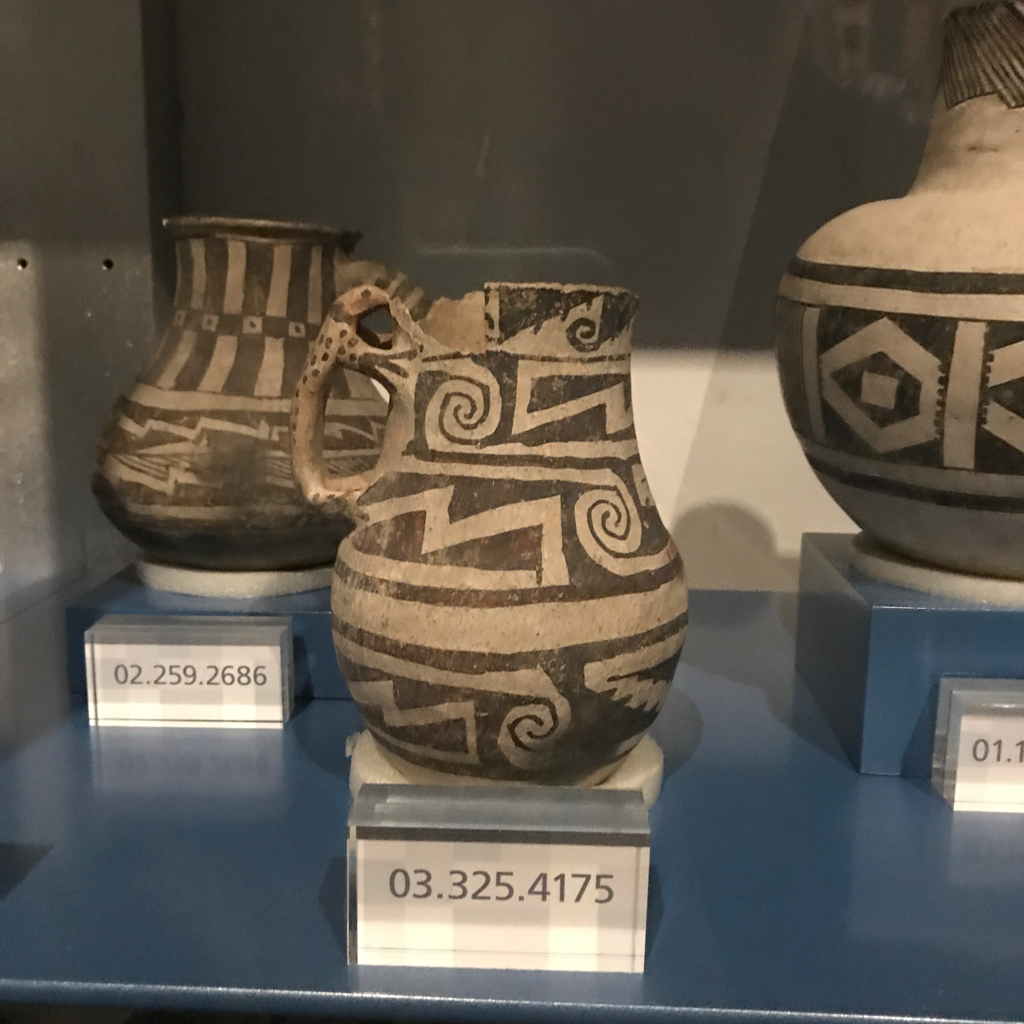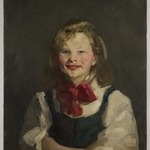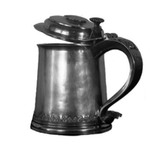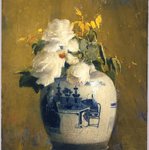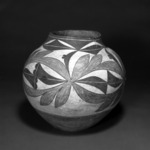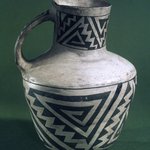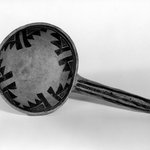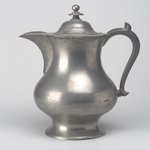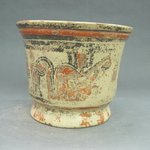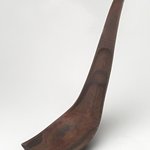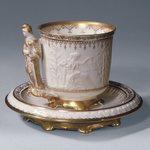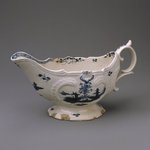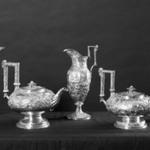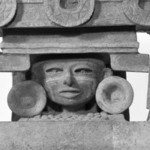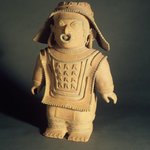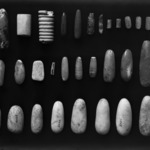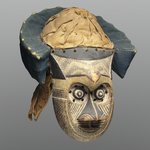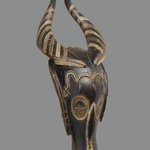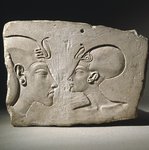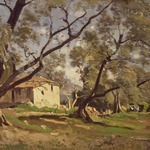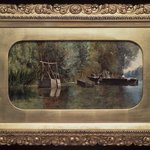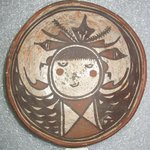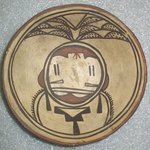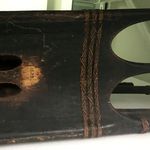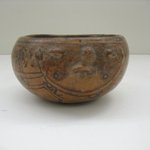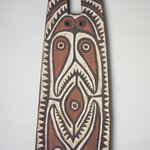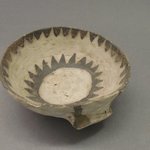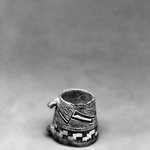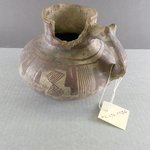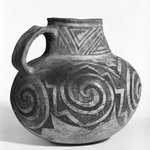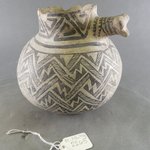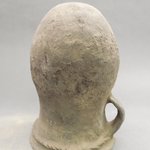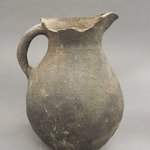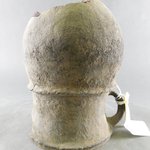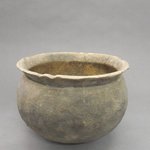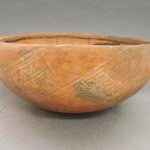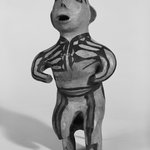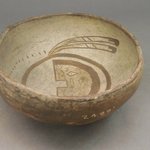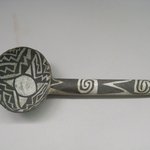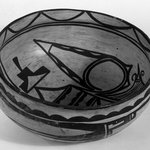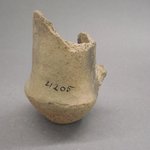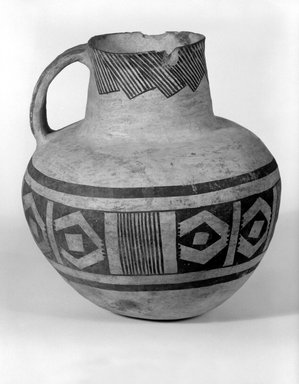
Pitcher with Black on White Geometric Design
Arts of the Americas
The Anasazi, ancestors of modern Pueblo peoples now living in New Mexico and Arizona, settled and farmed in the Four Corners region between about A.D. 1 and 1300. Originally, utilitarian Anasazi vessels were basketry, but by A.D. 500, clay that was hand-coiled, smoothed, painted, and baked in open-air fires became the medium of choice. One speculation is that the different black-and-white pottery designs may represent family, clan, or village affiliations, but since few designs are exactly alike, each may simply reflect the individual potter s imagination. This pitcher is a fine example of the thin clay walls that the potter could achieve and the dynamic interplay of line designs.
CULTURE
Ancestral Pueblo
MEDIUM
Ceramic, pigment
DATES
900–1300
DIMENSIONS
8 3/8 × 7 1/4 in. (21.3 × 18.4 cm) (show scale)



INSCRIPTIONS
Gummed label: 301 on shoulder, gummed label 1752 on inside of neck. 1/2 of original Culin exhibition label placed inside pot.
COLLECTIONS
Arts of the Americas
ACCESSION NUMBER
01.1538.1752
CREDIT LINE
Gift of Charles A. Schieren
CATALOGUE DESCRIPTION
Pitcher with handle between lip and shoulder. The bottom of pitcher is plain. Design is black on whitish gray. Handle has four black bands on the parallel coils. Band around center of pot has design sets of diamonds, alternating with vertical stripes enclosed by two thick bands. Shoulder and neck have diagonally slanting parallel lines with saw toothed ends. Mouth is plain.
Two chips on rim: long and shallow 3/4" and V-shaped 3/8," opposite each other. Some abrasion of paint, rusty discoloration on one side.
MUSEUM LOCATION
This item is not on view
CAPTION
Ancestral Pueblo. Pitcher with Black on White Geometric Design, 900–1300. Ceramic, pigment, 8 3/8 × 7 1/4 in. (21.3 × 18.4 cm). Brooklyn Museum, Gift of Charles A. Schieren, 01.1538.1752. Creative Commons-BY (Photo: Brooklyn Museum, 01.1538.1752_bw.jpg)
IMAGE
overall, 01.1538.1752_bw.jpg. Brooklyn Museum photograph
"CUR" at the beginning of an image file name means that the image was created by a curatorial staff member. These study images may be digital point-and-shoot photographs, when we don\'t yet have high-quality studio photography, or they may be scans of older negatives, slides, or photographic prints, providing historical documentation of the object.
RIGHTS STATEMENT
Creative Commons-BY
You may download and use Brooklyn Museum images of this three-dimensional work in accordance with a Creative Commons license. Fair use, as understood under the United States Copyright Act, may also apply.
Please include caption information from this page and credit the Brooklyn Museum. If you need a high resolution file, please fill out our online application form (charges apply).
For further information about copyright, we recommend resources at the United States Library of Congress, Cornell University, Copyright and Cultural Institutions: Guidelines for U.S. Libraries, Archives, and Museums, and Copyright Watch.
For more information about the Museum's rights project, including how rights types are assigned, please see our blog posts on copyright.
If you have any information regarding this work and rights to it, please contact copyright@brooklynmuseum.org.
RECORD COMPLETENESS
Not every record you will find here is complete. More information is available for some works than for others, and some entries have been updated more recently. Records are frequently reviewed and revised, and we welcome any additional information you might have.


